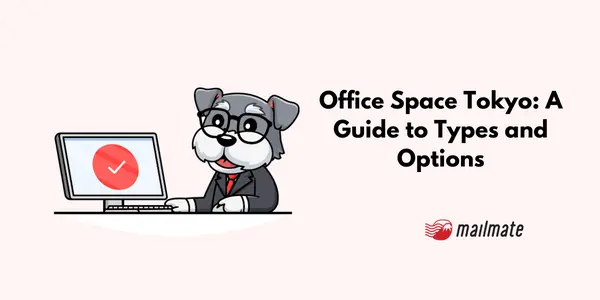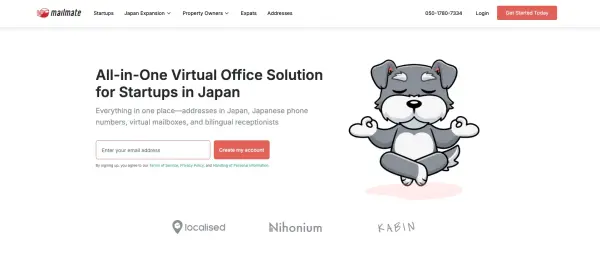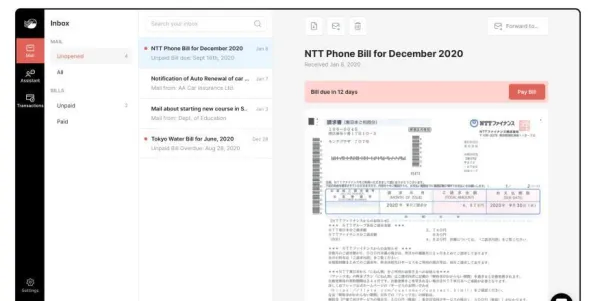Office Space Tokyo: A Guide to Types and Options

Looking for office space Tokyo locations? Wondering what your options are?
There are a wide variety of terms that cover the different kinds of office spaces available in Tokyo.
Here, we cover what those various terms actually mean, plus the pros and cons and average prices for each to help you fine-tune your search.
For a quick overview, here’s a chart that summarizes the main findings in this article:
Office Type |
Pros |
Cons |
Average Prices |
Suitable For |
Private Office |
High security, flexibility, fully furnished, communal spaces |
Pricier short-term, limited changes, limited people |
¥65,000–300,000 /mo |
Startups, temporary satellite office |
Virtual Office |
Low cost, flexibility, privacy |
Need separate workspace, may face loan difficulties |
¥660–¥11,000 /mo |
Freelancers, startups |
Serviced Office |
Low short-term cost, professional reception, tenant networking |
Limited usage, slow internet, extra fees for registration |
From ¥24,900 /mo |
Business needing concierge experience |
Coworking Shared Space |
Low cost, networking opportunities, various seminars/events |
Vulnerable to eavesdropping, lack of seats, lack of control over environment |
¥10,000–¥50,000 /mo |
Wide variety of industries |
Note: This article doesn’t explore “rental offices” or leases for an entire building or a floor of a building. Rental offices and rental contracts are best sourced through real estate professionals.
Private offices in Tokyo

A private office (プライベートオフィス) is a personal office space that individuals or companies can use by renting. The office can be locked for privacy, and its address can be used for registering your business.
Private office Tokyo locations are often fitted with basic furniture like desks and chairs and are generally cheaper in the short term than rental offices (レンタルオフィス) as they don't require you to outfit the office space.
These facilities often have communal lounges and meeting rooms annexed to private office rooms for individuals to use.
Pros of private offices
A private office is a flexible work space or office space that accommodates various work styles and work needs, including sole proprietors who don’t have an office space of their own, start ups in need of a short-term office, or a temporary satellite office for a team driving a project forward.
Since private offices have communal spaces linked together, you will have plenty of opportunities to make new connections if you so desire.
These offices are already built and designed for immediate use (meeting rooms, etc.), so there is no need to invest in renovating the office, buying office items, and setting up an internet environment. This means you don’t need to allocate large amounts of money just to set up your office.
Typically, private offices come with a high amount of security systems in place, such as entrance cameras, auto-locking doors that can be opened with card keys, and building security guards.
Cons of private offices
Although private offices tend to be cheaper than other offices in the short term, they are pricier than virtual offices or coworking spaces.
Although there is the freedom to buy and add furniture and arrange them how you like, major changes to the interior are often not allowed.
In some cases your contract will specify how many people are allowed to use your private office at one time. If you need to engage in activities that add an extra person or two to your space, you might have to use the attached conference rooms.
How to find private offices
Intermediary services may be able to find and book an office in Japan on your behalf. There are plenty of portal sites that introduce available office options online, including some listings in English.
If you can read some Japanese, try using the keywords “area name in Japanese” + “プライベートオフィス” for organic searches.
Once you find an office that may fit your needs, call the facility to get further details.
Average prices for private offices in Tokyo
According to reporting by Billage, a virtual office & co-working spaces provider, the following are some of the average office Tokyo prices for popular business districts in Tokyo (price per 3.3 square meters).
Shinjuku ward—¥65,000 to ¥170,000
Chiyoda ward—¥85,000 to ¥210,000
Shibuya ward—¥70,000 to ¥180,000
Virtual offices in Tokyo
A virtual office (バーチャルオフィス) is a service that rents out a physical address and a phone number that one can use to not only register their business but receive mail without actually leasing a physical location.
Virtual offices are great alternative to private office Tokyo locations as they are significantly cheaper and and you rent the address without committing to long contracts.
This is a great option for Japanese startups and freelancers that value flexibility, as you will be able to keep your starting costs lower than actually renting a physical office. Additionally, the renting process is less complex than signing a lease.
Pros of virtual offices
You can use the office for a short period of time.
You can keep business overhead low.
You can report fees as expenses.
You can use the virtual office address to register your company in Japan.
If you're working from home, using a virtual office address for your business adds an extra layer of privacy between you and Google search.
Certain virtual office providers also include a virtual mail service that will scan and digitize your physical mail for you.
Cons of virtual offices
You'll need a separate coworking space for operations, meeting rooms, etc.
Getting loans may be difficult for your business.
Depending on the industry or occupation, you may not be able to register your business with a virtual address (lawyers, detectives, garbage disposal businesses, etc.).
How to find virtual offices
If you are comfortable with Japanese, you can try the following keywords if you're interested in cheap prices:「バーチャルオフィス+name of the area or nearby station+格安or最安値」
Or, consider MailMate.

If you need an address in Japan but without needing a physical office, than virtual office addresses is the answer.
a) Company incorporation
MailMate provides you with a virtual office address that can be used to register your company in Japan. A virtual address is completely compliant for those looking to open or expand their business here.
They also provide registration support as well! From handing and submitting the paperwork to ensure everything is set up correctly.
Additionally, any paperwork that comes through will be explained for you to understand what each paperwork is.
b) Virtual mail service
When you use MailMate’s virtual address, you can also use their virtual mail service to view your Japanese mail online.

Your personal and business mail can be sent to MailMate’s scanning location, where the outside content will be scanned to your dashboard. From there, you can choose to open, forward, shred, and even pay your bills with a click of a button.
This feature is perfect for those away from business owners using MailMate’s virtual address or those away from their personal residence and still want to receive their mail.
c) Bilingual support
MailMate’s bilingual support is here for those who are struggling with Japanese mail.
When your mail comes in, you’ll get a translated english summary of its content. From legal documents, bills, to city papers, you’ll know exactly what each mail is.
Our staff are both fluent in Japanese and English to help when you have trouble related to your mail or your business.
Average prices for virtual offices in Tokyo
Prices may range from ¥660 to ¥11,000 per month, depending on the service companies’ location and the options of the plan.
The most basic plan will only give you an address, while premium plans often include extra services.
Serviced offices in Tokyo
There's quite a bit of overlap between "private offices" and "serviced offices." They are used interchangeably at times, but the key differences are in the areas of focus.
Serviced offices (サービスオフィス) provide features and solutions on top of security-ensured private rooms that are available by paying monthly fees.
For example, in a serviced office, receptionists staff the front desk, and they will take care of mail and handle guests, which is a great help for short-staffed businesses. Serviced office Tokyo locations will also have meeting rooms and communal lounges that are free to use once you are a member.
Here are some examples of various features offered by serviced offices:
Reception support
Telephone handling
Handling of delivered items during absence
Secretary outsourcing
Conference operation support
Document and material organization and creation
IT services
Food provision
Event space usage
Printing facilities
Seminar hosting
Business matching, etc.
Rental offices, private offices, and serviced offices give you your own personal space for work with monthly fees.
The main difference between private offices vs serviced offices is that serviced offices provide features that focus on giving the business owner or user a concierge experience. In contrast, private offices are more focused on allotting you physical space from which to run your business.
Pros of serviced offices
Low running cost in the short term.
You can make a good impression on your clients and guests as the communal space has a front desk and takes care of the reception in a professional manner.
You can mingle with other tenants using the other serviced offices.
Cons of serviced offices
Limited usage for various business types. (Using these spaces as a BtC store or using them as storage of your inventory is not permitted. Also, placing heavy equipment and furniture may not be allowed depending on the office. Renovating the office space is not allowed.)
Most of these offices are equipped with Wi-fi, with some exceptions being equipped with LAN cables. Since many people may frequent the communal lounges and meeting rooms, the internet might be slower than you like. This may be problematic if speed is paramount, especially when conducting online conference calls.
Depending on the provider, you may need to pay extra fees or switch plans to use the address for company registration in Japan.
How to find serviced offices
WeWork.com, Regus, and The Executive Center provide listings in English on both private and serviced offices.
If you are comfortable with Japanese, Service-office.jp is a portal site that provides a comprehensive list of all the serviced offices in Japan. You can drill down your searches to focus on areas near Shibuya station, Tokyo station, etc.
Alternatively, try サービスオフィス + “name of the city or district” as a Google search.
Average prices for serviced offices in Tokyo
One example of serviced office pricing is available from Regus, which starts at ¥24,900 per month. But there are other Regus alternatives and office space providers that will cost more or less.
Coworking space/shared offices in Tokyo

While co-working spaces (コワーキングスペース) and shared offices (シェアオフィス) provide a place to work in a communal setting, a co-working office heavily emphasizes the community-building aspect, and a shared office focuses more on the office function.
Unlike private office Tokyo locations, coworking spaces and shared offices can be used by paying monthly fees, but some offer “drop-in” deals where you can pay per use basis. This is especially useful when you only need office space temporarily and you're looking for a workspace with good access to business districts.
Pros of coworking/shared office spaces
One of the lower-cost options for business owners, as the space is equipped with commonly used business items, such as desks, outlets, wifi, etc.
These offices are used by people from a wide variety of industries. Interacting with other office users may lead to new ideas and discovering business opportunities.
Many seminars and events are hosted in these spaces. Joining them may help you network or learn something new.
Cons of coworking/shared office spaces
Since these office spaces are communal, confidential subjects and materials are more vulnerable to eavesdropping, theft, or sabotage.
When there are too many people using the office, you may be unable to find a seat or stay as long as you like. Also, the lack of a closed-off private room will inadvertently result in chatter around you that you can’t shut out, which may negatively affect your concentration.
You cannot control the room temperature.
How to find coworking spaces/shared office spaces in Tokyo
Use the following keywords: “コワーキングスペース + name of the area or 近くの”
There are apps for coworking space listings, such as Droppin by NTT that you can take advantage of.
Average prices for coworking spaces/shared office spaces in Tokyo
Monthly prices for a “fixed seat 固定席” in a co-working space in Tokyo range from 30,000-50,000, while a “free seat 自由席” is set lower with a price range of ¥10,000-¥15,000.
For “drop-ins,” while there may be places that offer ¥1000 per day, the average price is set around ¥300-¥500 per hour.
Frequently asked questions
What's the difference between a private office and a rental office in Japan?
While there is some overlap in how many use this term in Japan, for the most part a private office refers to a pre-furnished space outfitted with desks, tables, and other office-related necessities. Whereas a rental office refers to a space that can be rented and used as an office but it will often come without any furnishings and must be outfitted by the leaser.
What's the difference between coworking spaces and shared offices in Japan?
While co-working offices and shared offices provide a place to work in a communal setting, a co-working office heavily emphasizes the community-building aspect, and a shared office focuses more on the office function.
What's the difference between private offices and serviced offices in Japan?
In Japan, “serviced offices” and “private offices” are often used interchangeably. However, one distinction can be made for “serviced offices” as they focus on giving the business owner a concierge business experience.
In closing
Knowing the terms used for the various office types will give you a leg-up when going shopping for office space in Japan.
Renting is pricey, so if you're interested in the most cost-effective solution to office space Tokyo locations, consider using MailMate—Japan's only bilingual virtual mail provider—as your all-in-one virtual address and virtual mail solution!
Spending too long figuring out your Japanese mail?
Virtual mail + translation services start at 3800 per month. 30-day money-back guarantee.

